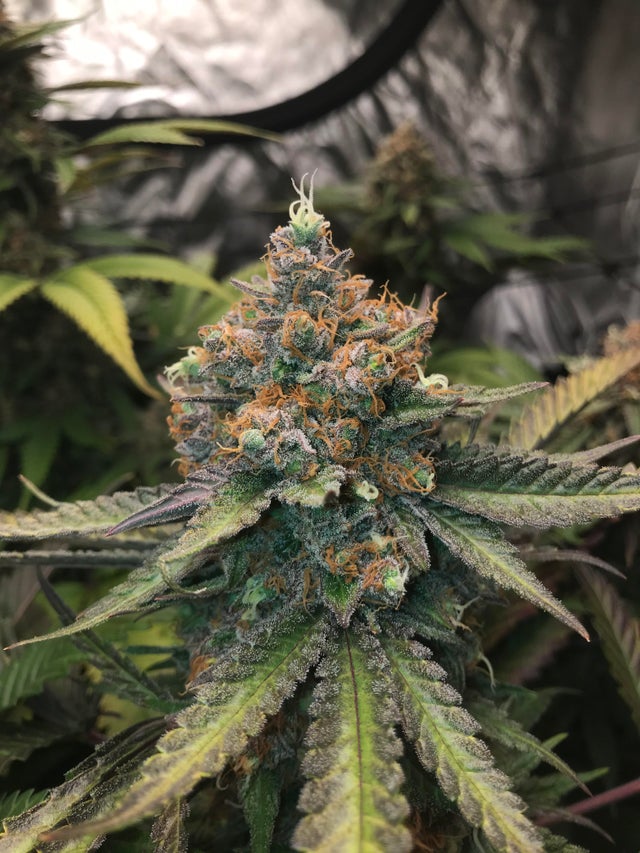
(Photo Credit: u/gilmopz, Dos-si-Dos #33, week 9 of flower)
Hey there fellow cannabis connoisseurs!
Today we will be talking about one of my favorite topics: G.O.D.
Growing Organic Dank
I love this hobby from the bottom of my heart, what other hobby gives you fresh, sugary nugs? No other hobby will give you fresh nugs, none!
I never really understood exactly what bottled nutrients were really doing "under the hood", so I made it my mission to educate myself on soil ecology, and organic growing, and organic nutrients. I have a voracious appetite for information on how to grow great cannabis.
Ironically, I'm too lazy to futz with hydroponics/aeroponics/aquaponics systems, so I stick with soil, and I couldn't be happier. Once I got my soil dialed in just right, all I have to do is water my plants when they are dry, and harvest when ripe.
I'm not disparaging those who use hydro/aero/aqua-ponics systems, if it works for you, great! Soil works for me.
So without any more blah blah blah... let's dig in.
Organic Growing: Part 1
First, a nod to the OG's
I would like to put out a big universal Thank You to authors Greg Green, Jeff Lowenfels, and Skunk Magazine's enigmatic "The Rev". These guys are fantastic growers and have written some excellent material on the subject of organic growing. They are the primary reason I'm here writing this article.
I highly recommend the following books by these authors:
- "Cannabis Growers Bible" by Greg Green
- "Teaming with Microbes" by Jeff Lowenfels
- "True Living Organics" by The Rev
All these books are available in Kindle format at Amazon, I cannot recommend them enough if you are interested in growing organic Cannabis. They are worth your time if you want to understand the art and science of growing high quality organic cannabis, plus purchasing their books helps support our community of growers who are sharing decades of valuable knowledge.
( Photo Credit: u/woodyharrelsonsbong, Purple Marmalade Solfire )
Introduction
To introduce you to organic growing I am basically going to summarize Jeff Lowenfels concepts as best I can.
Soil nutrients, soil microorganisms, and plants form a symbiotic loop. They evolved this way: together.
Damage this loop and you'll end up with suboptimal cannabis.
This means that organics requires first understanding the soil ecosystem, the creatures that populate it, their role in various functions within the soil and interacting with plants.
Soil Denizens
- Bacteria: This includes a wide range of bacteria, from ordinary soil dwelling bacteria, to specialized nitrogen-fixing bacteria, your soil needs to be teeming with the right kinds and balances of these little helpers.
- Fungus: Soil dwelling fungus play a very important role in the soil. They stretch out mycelium networks into the surrounding soil to find nutrients and moisture, and can ferry these along their network for quite a distance. Some fungi, called mychorrizae are capable of forming a special symbiotic relationship with plants, feeding them nutrients and water and in return the plant provides shelter near its roots as well as producing a sugary exudate substance at the tips of its roots which in turn feeds the mychorrizae.
- Actinomyces: These specialized microorganisms are actually what is responsible for that "fresh-earth-after-rain" smell after a decent rainfall. They are known for the important role they play in soil ecology; they produce a number of enzymes that help degrade organic plant material, lignin, and chitin. Thus their presence is important in the formation of compost.
- Protozoa: These are the single celled predators of the microorganism world. Their function is to feed on the soil bacteria and fungi and keep their populations in check. They play another important role: by eating bacteria and fungi, and pooping them out, they are actually taking "bound" organic nutrients (bound, as in, the nutrients were inside and a part of the bodies of the bacteria/fungi), and making them bio-available for your plants to consume.
- Nematodes: A nematode is basically a microscopic worm. Some nematodes are beneficial, they will attack things that might go after your plants (in the past I've used a species of nematode to try and combat a soil gnat infestation), but most of the time nematodes are a pest. But not to worry, there aren't many nematode species that specialize on chewing on Cannabis.
When these populations of soil microorganisms are balanced, and they have a sufficient level of nutrients to draw from, it forms the perfect environment for your plants to go "roots down" and thrive.
In organic growing the main premise is "we are not feeding the plant, we are feeding the soil ".
( Photo Credit: u/myweedsgotseeds, Blueberry )
The Organic Chain
The soil microorganisms feed on the same stuff your plant feeds on, in fact your plants have evolved to work cooperatively with these soil microorganisms. Mychorrizae fungal networks interface directly with plant roots and ferry nutrients and moisture to the plant, effectively increasing the reach of the roots. Some nitrogen fixing bacteria need special anaerobic environments which plants provide in exchange for a share of the valuable nitrogen. Together all these soil microorganisms also function to break down soil nutrients into a form that is directly absorbed and usable by plants.
The reason for the fuss over organic nutrients is that they are very friendly to your organic soil ecosystem. Trying to grow organic, but using inorganic fertilizers will impede, harm, or destroy the delicate soil ecosystem, and since that is the process that is feeding your plants what they need, when they need it, this will have an effect on the final quality of your organic cannabis.
This is why it is important to honor the rule of organic nutrients: no chemical based nutrients! Certified organic only!!
Look for USDA or OMRI organic certifications, buy products that are certified, even if they are a bit more expensive. Your soil will love you for it!!! Think of it like buying the primo, chewy treats for your pet dog, they cost a bit more, but you can tell your doggo is pleased and so the extra cost is worthwhile because it leads to satisfaction. Well, you love your plants too right? Treat them well, and they will return that love back to you many times over!
( Photo Credit u/SIVIOKATRON, Strawnana MAC, day 49 of flower )
The Seed of Truth
Your job as a grower is to remove every obstacle and impediment that your plants might face, and then allow them to grow into that space. They will achieve the apex of their genetic potential every time. Set up the ideal environment and then get out of the way, the plant will do the rest! This means that you as the grower need to understand the plants nutritional and environmental needs, and provide them in the right balance at the right times, in order to nurture your plant to its full potential.
The Five P's: "Proper Preparation Prevents Poor Performance"
In the world of organic cannabis gardening, this means that you have to prepare the soil first, and you need to know what to mix into the soil in order to sustain your plants to their full potential.
Most of the organic nutrients that you want to add to your soil are too "hot", or they are slow to break down in the soil. These elements need to, as The Rev puts it, "cook off". The process that we use to prepare the soil is called... wait for it.... composting.
Yes, simple old composting: making a pile of organic matter, innoculating it with the soil "F.A.B." (Fungi, Actinomyces, and Bacteria), then keeping it moist and turning it every couple of days, for several weeks until the FAB have consumed the organic material and turned it back into rich soil.
You don't have to start from scratch though, I often start with a bag of organic compost that I bought at the local nursery, earthworm castings, a dash of perlite (if the compost doesn't already contain it), and a hefty dollop of some sort of soil conditioner (which helps aerate, improves drainage a bit, and provides a long time source of nutrition for soil fungi, which love to break down woody/cellulose types of material).
In part 2, I'll go into greater detail about nutrients.
If you liked this article, hit that upvote button, hit that follow button, and if you feel like it, drop a comment down below!
Till then, happy toking you buncha stoners!
Cannabis Growers Bible" by Greg Green literally had an original from my uncle read that shit until it fell apart and i didn't start smoking until like 2009. However even before I smoked I was interested in growing cannabis.
I started smoking in 1997, and was immediately interested in growing. It only took me 23 years to realize that dream!
!ENGAGE 14.20
ENGAGEtokens.Congratulations @howwwwl! You have completed the following achievement on the Hive blockchain and have been rewarded with new badge(s) :
You can view your badges on your board and compare yourself to others in the Ranking
If you no longer want to receive notifications, reply to this comment with the word
STOP@canna-curate Am I doing it right?
Yeap! Sure are. I have to agree, soil grows the terpy stuff. And when you do it as close as Mother Nature, they come out even better!
Thanks for your help and feedback, I'm still learning the nuances of weedcash.network, I appreciate you taking the time to make suggestions and to actually reply with feedback, I really appreciate it!
Hey man no problem! As long as you stay on subject here, I’ll support you. What I mean by that is like don’t post about kites and birds here lol.
What some people are not aware of, this place is not only for cannabis content, but also psychedelics. So if you like to write about that, weedcash is the place:)
That’s the canna Discord. Fell free to stop by anytime